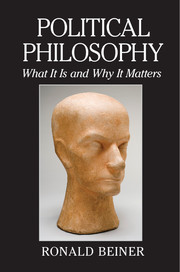Book contents
- Frontmatter
- Dedication
- Contents
- First Prologue: Horizons of Political Reflection
- Second Prologue: Freud, Weber, and Political Philosophy
- 1 Hannah Arendt: The Performativity of Politics
- 2 Michael Oakeshott: Life’s Adventure
- 3 Leo Strauss: The Politics of Philosophy
- 4 Karl Löwith: In Awe of the Cosmos
- 5 Excursus on Nature and History in the Strauss-Löwith Correspondence
- 6 Eric Voegelin: Modernity’s Vortex
- 7 Simone Weil: The Politics of the Soul
- 8 Hans-Georg Gadamer: Philosophy without Hubris
- 9 Jürgen Habermas: Politics as Rational Discourse
- 10 Michel Foucault’s Carceral Society
- 11 Alasdair MacIntyre: Fragmentation and Wholeness
- 12 Short Excursus on the Rise and Decline of Communitarianism as a Political Philosophy
- 13 John Rawls and the Death of Political Philosophy
- 14 Richard Rorty: Knocking Philosophy off Its Pedestal, or the Death of Political Philosophy Postmodernized
- Epilogue: On Not Throwing in the Towel
- Index
- References
12 - Short Excursus on the Rise and Decline of Communitarianism as a Political Philosophy
Published online by Cambridge University Press: 05 August 2014
- Frontmatter
- Dedication
- Contents
- First Prologue: Horizons of Political Reflection
- Second Prologue: Freud, Weber, and Political Philosophy
- 1 Hannah Arendt: The Performativity of Politics
- 2 Michael Oakeshott: Life’s Adventure
- 3 Leo Strauss: The Politics of Philosophy
- 4 Karl Löwith: In Awe of the Cosmos
- 5 Excursus on Nature and History in the Strauss-Löwith Correspondence
- 6 Eric Voegelin: Modernity’s Vortex
- 7 Simone Weil: The Politics of the Soul
- 8 Hans-Georg Gadamer: Philosophy without Hubris
- 9 Jürgen Habermas: Politics as Rational Discourse
- 10 Michel Foucault’s Carceral Society
- 11 Alasdair MacIntyre: Fragmentation and Wholeness
- 12 Short Excursus on the Rise and Decline of Communitarianism as a Political Philosophy
- 13 John Rawls and the Death of Political Philosophy
- 14 Richard Rorty: Knocking Philosophy off Its Pedestal, or the Death of Political Philosophy Postmodernized
- Epilogue: On Not Throwing in the Towel
- Index
- References
Summary
If political philosophy is about confronting radical alternatives with respect to possible visions of human life, the theoretical debate between liberalism and communitarianism ought to reach down to the philosophical foundations. One could, for instance, contrast the highly individualized life typical in Western societies with the intensely communal life monks experience living in, say, a Tibetan Buddhist monastery. Such a contrast would indeed open up truly far-reaching philosophical issues. Suppose it really is true that in order for human beings to flourish fully, they require a much thicker constitution of memory, identity, and communal purpose than contemporary liberal societies make available. What if life in a cloistered monastery more nearly approaches what is required to meet the essential needs of human beings than life in our own high-paced, high-mobility society? What sort of judgment would be cast upon the highly pluralized and highly individualistic societies of the West if a quiet, static, and rigidly communalized monastic life really defined the standard of judgment for a fully human life? Ought we to assume so complacently that our society constitutes the defining norm – a kind of society where millions of people live in deracinated and soulless suburbs, where individuals decide what kind of car to buy and where to drive it, decide who to marry or whether to reproduce, where consumer choices loom larger than loyalty to a way of life, where a regime of individual rights is fundamental and social obligations are secondary?
We know what the standard liberal-pluralist rejoinder would be to the hyper-communitarian vision of life associated with life in a Buddhist monastery. Why legislate this issue, as important as it is, for all human beings? Let individuals choose. Let those who are attracted to the virtues of the monastic life choose that life. And let those who prefer lives characterized by more variety and more risk choose those very different lives. Issue settled! But of course the liberal-pluralist solution begs the very issue posed by the communitarian challenge in its purest form. For if the contest between individual liberty and communal identity is rendered contingent on individual choice, then the balance is already tilted toward the individualist side, and a form of community life that is more than a construction of individual choices is surreptitiously removed as a real possibility.
- Type
- Chapter
- Information
- Political PhilosophyWhat It Is and Why It Matters, pp. 189 - 197Publisher: Cambridge University PressPrint publication year: 2014



